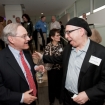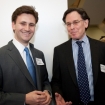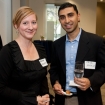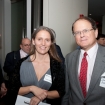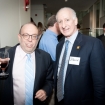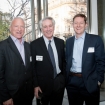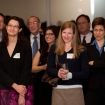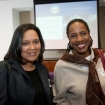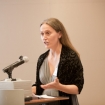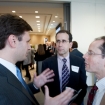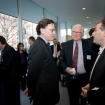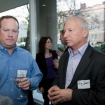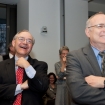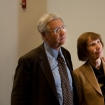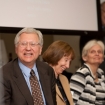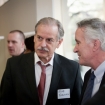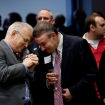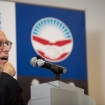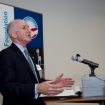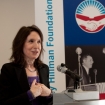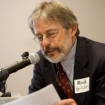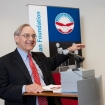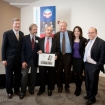E.J. Dionne Receives a Hilllman Award for Career Achievement
Photo credit: Toby Jorrin
On April 7, 2011, the Sidney Hillman Foundation presented Washington Post columnist and author E.J Dionne Jr. with a Hillman Award for Career Achievement in Washington DC for his contributions to progressive journalism. The evening’s program included remarks by Hillman Judges Hendrik Hertzberg, Harold Meyerson, Katrina vanden Heuvel, as well as Thomas Mann.
Below is Dionne’s speech from the event.
I just want to say thanks, thanks from the bottom of my heart for this award and for all those beautiful things you all just said. I feel like I’m attending my own bar mitzvah 46 years late. I am so grateful that my editors Autumn Brewington and Jim Hill and Fred Hiatt and Alan Shearer and Richard Aldacushion and Karen Green and my personal first and last line of defense Emily Luken did not have to fact check any of those speeches. Lord knows if anything would have been left in them. If I could believe all those things that Katrina and Tom and Rick and Harold just said about me, I might give me this award, too. But I know me better. I have always loved a story Tom Daschle tells about being described as “a model Senator, a model South Dakotan, a model husband and a model father.” He was all excited about this, told his wife and she looked up the meaning of model in the dictionary. She came back and said, “model – a small imitation of the real thing.” I accept this award in that spirit. I contrast those wonderful speeches with a letter I once got from a reader. “Dear Mr. Dionne, Are you as dumb in person?” If I don’t talk too long, maybe none of you will be able to answer that question. But I may prove him right, because there are a few things I want to say tonight.
When Harold called me about winning this lifetime achievement award, my first reaction was, “Aren’t I too young for that?” My wife Mary said, “Lifetime achievement? That’s what they give John Wayne when he’s 80.” Then I learned that it was for “career achievement,” and I felt much better. I think it’s one of those euphemisms. You know, you’re not fat, you’re cuddly. But I am very grateful for this euphemistically named award, in part because it provided the only occasion on which Mary ever compared me with John Wayne. She insists, by the way, that she never did use John Wayne in that quote, but she did give me permission to quote her, or misquote her, as the case may be. She’s very tolerant of me, and I’m always grateful for that. And again, I’d remind you that none of the speeches tonight were fact checked.
Right off the top, I just have to thank the late Meg Greenfield for first inviting me to write the column, Fred and Autumn for running it regularly – Fred runs my column when he agrees with it and when he doesn’t and I treasure that freedom and I am grateful for it – Alan and Jim for syndicating it, some dear old friends Bill Schneider and Jack Rosenthal and the late Flora Lewis for getting me into journalism. I thank Tom Mann and Jack DeGoia for getting me into the world of think tanks and academia. And I would be terribly remiss if I did not thank my dear friend Steve Luxenberg, one of the wisest and most decent human beings I know and someone who has always been there for me when it mattered most.
I could really go on and on like this all evening because there have been so many people who have been so good and generous to me over the years, so warm and helpful and loyal. I have always said that if God judges me by my friends rather than by who I am or what I have done, I will be okay. There must be a part of heaven reserved for people who only have virtue by association. But if I thanked all the people I ought to thank, I would take hours and hours and end up doing an imitation of the United States Senate, a body I have said on occasion that I would just like to abolish, or failing that, radically reform. I could put all the great filibusterers of the past – back when we actually had real filibusters – to shame. So by way of saying thanks to all the friends I cannot name, let me cite Shakespeare who wrote that “A friend should bear his friend’s infirmities.” My friends have always done that, and I have obliged them by giving them a very large number of infirmities to work with. That is Shakespeare’s rendition of Barney Frank’s definitive line defining a political base: “The base are the people who are with you when you are wrong.” I have been blessed with a generous base.
I do hope you will indulge me because I do want to tell you how brilliant I have been in one respect: I made the most important choice in life. I arranged to have great parents and a great sister. And – this one I actually did have a bit to do with – I have a truly wonderful family now. I talk about my family only very occasionally in the column, so I want to say a few words here. And I actually have a rationale for doing so because this links to one of the couple of points I want to make tonight. (All writers find ways of rationalizing doing what they want to do anyway, as all my editors know.)
It’s one of my greatest political frustrations that an argument regularly made by conservatives that I agree with and an argument regularly made by liberals and progressives that I also agree with are rarely brought together. Conservatives are absolutely right to insist that if you care about the good society, you have to care about the health of our families. Family values and social justice go together. I don’t mean family values the way some people might use the phrase to turn on gays and lesbians, who are part of so many of our families or extended families, including my own. I mean it the way Daniel Patrick Moynihan meant it – that stronger families are good for kids. Yes, social justice depends in significant part upon what government does to enhance opportunities, to protect civil rights, to prevent discrimination and to help those who need it.
But government simply cannot replace families or do all the things that parents ought to do. Yet believing this out to lead you to the great progressive truth: That absolutely no one in any society can claim to be self-made, to have done it all by themselves. Most had great parents or someone who was a great role model or a teacher or a coach or a rabbi, a minister, a priest, an imam. Many grew up in strong communities. Many had spectacular people who worked with and for them. And God forbid we mention that sometimes, these very successful people even had help from government, in the form, perhaps, a good public school or a government student loan. Anyone who is successful or at least is seen by the world as successful enough to get awards like this one, needed others to get there.
I owe a lot to my home town of Fall River, Massachusetts, because it taught me so much of what I know, including one large truth: that solidarity and achievement go together. My town is famous as a union town – Sidney Hillman’s union was once very strong in Fall River – as well as a working class town. But it also took on as one of its titles “The Scholarship City.” It’s not just that a lot of kids in Fall River needed scholarships. It’s also that a community that taught solidarity in its churches and synagogues and union halls also valued the individual achievement. We really tried to lift one another up. “We are part of one another,” as St. Paul wrote. That’s what my life has taught me. That’s why I feel gratitude and indebtedness. Assuming for the sake of argument that I even deserve this award – and arguing otherwise would just wreck the evening – I wouldn’t even be here without a lot of solidarity in my life, or without a little help from social security survivors benefits and my dad’s veterans benefits and government scholarships and student loans. I think “It’s a Wonderful Life” is one of my favorite movies because I come from Fall River. Think of the scene where George Bailey is pleading with his neighbors and customers not to panic when the savings and loan is about to go bust, not to look out for themselves alone. “We can get through this thing all right,” George says. “We’ve got to stick together, though. We’ve got to have faith in each other.” I think those are the core values behind this award and they characterize the attitude of so many of those who have won it over the years.
And so let me briefly tell the story of the very most important people in my life so I can briefly pretend that I’m on the set of “It’s a Wonderful Life.” From your point of view, that’s a lot better than hearing me sing all the old union songs I love.
Two people can’t be here. My late dad taught me to love politics and he taught me how to argue, and to love argument. You could say that without realizing it, he trained me for the life I have been lucky enough to live, and maybe that’s what he had in mind, even though to this day, I don’t know exactly what he’d make of my views, except that he’s enjoy arguing with me. Probably my very favorite column was the one I wrote was on the occasion of the 30th anniversary of dad’s death – he died in 1968 – and I spoke of how much my dad and I loved to talk and argue about everything having to do with politics and everything about why the Red Sox, in those days, were losing. There are few greater blessings than having a dad who is warm, loving, ebullient and full of life. He would be 100 years old on May 2, and I miss him still. I noted in that column that 1968 was a year in which our country lost three truly great and good Americans, Martin Luther Kind, Bobby Kennedy and my dear, dear dad. And I was lucky to have two second fathers after my dad died, my uncle Ray, with whom I argued about politics constantly but joyfully on both our parts, and my dear, dear friend Bert Yaffe, a progressive Marine veteran who has been a real guide to me all my life. He’s still with us at 90 years old and still fighting for the right as he sees it (and I happen to agree with him). All kids should be as lucky as I was back then to have such great people step into the breach in their lives. Again, I felt the support of a whole community.
My late mom, like my dad, was a lover of politics, equally generous in her service to our community and to others, and one great politician. She was a teacher and a librarian and active with our community college in Fall River. My mom’s passion was to get kids to read and to encourage teen agers, especially kids whose parents never went to college, to aspire to higher education. And boy was she a good organizer. When President Reagan cut the community development program and her storefront branch library that served needy and working class kids was threatened with closure, she organized the most brilliant campaign you could imagine. 1,500 kids signed a petition – no mean feat in a city of 100,000 people – and long before anyone was talking about faith-based partnerships, she made sure that the first four witnesses at her public hearing were a priest, a rabbi, a minister and a nun. So many people called the Mayor on her behalf that he started picking up the phone and saying, “Tell the woman she’s got her money.” God, I loved my mom. She was an AFSCME member, and appreciated the good that unions could do, but she was no party line union member. When she got her union card, she gave it to me saying, “This might mean more to you than it does to me.” Yet precisely because she was so honest and independent, the union’s business manager Gil Ferreira, a family friend who was once with Sidney Hillman’s union, would consult with her, knowing she’d give him the straight story of what was happening in her part of our city government. I sure wish she were here today.
My wife Mary is not one for either wanting or craving mention in speeches like this, especially by me. She’s a warm, strong, loving, smart and wise person and I love her so much. People ask her sometimes if I ask her to read my columns in advance. She always says, and it’s true, that I only show her a column when I know I am making a mistake, large or small, and she always knows exactly what’s wrong and has delivered me from many errors and much foolishness. She has done the same with our dear kids, James, Julia and Margot. Bragging about them is one of my favorite activities, but I started on that, I’d make the U.S. Senate seem like a Trappist Monestary. And in deference to Mary’s desire to have me say no more, I will just make two points. Something this crowd might particularly appreciate: she once told me that one of the few things she could absolutely never abide is if I ever crossed a picket line. I met Mary on Easter Sunday in 1987 on the escalator of the Woodley Park metro station. And I’ll express my gratitude as only a borderline political obsessive of progressive inclinations could: I thank the designers of the DC Metro system for locating that stop at Woodley Parl. Never has anyone owed more to an agency of government. And imagine how much poorer my life would be if the government had been shut down that day and the Metro had been closed.
I have only one sibling, so I am very lucky that I got a great one. My sister Lucie-Anne has lived a life of service, as a teacher, as a member of the United States Navy JAG Corps and then of the Navy Reserves – she retired after 26 years as a Captain, so I always want to salute her – and now as a civilian lawyer for the Navy. Nobody loves our country more or is more committed to making it better. To give you a sense of where my sister is coming from, I first learned that Bill O’Reilly had named me a pinhead one night through a text message from Lu. Her first word was: “Congratulations.” Lu is my older sister, the responsible one in the family, the organized one, the one who had to look out for her kid brother. She was so important to our mom after dad died and has been so important to kids she taught, including kids others saw as unteachable, and to her military colleagues, for whom she has always been there, especially in these very challenging times for our men and women in uniform, and to her own family, her husband Drew and her daughter, Kim. Lu, you’re one of my heroes, and I love you.
And Mary’s mother Helen, the best union member in this room, a proud lifetime member of 1199 in New York – she’s with us tonight. Having a wonderful wife is a great blessing. Having a spectacular mother-in-law is, to hear people talk, a miracle. There are few people who have done more in my life to teach me about what it means to live in hope, even in the face of adversity, and to live a joyful life, even in the face of difficulty. She is one of the best Catholics I know, in every sense of the word “best.” I always try to explain to non-religious friends that Helen is religious in the best possible way. Yet I puzzled over the years to think through exactly what I meant by that, since the phrase seems to imply that you can also be religious in the worst possible way, and while that’s true, as someone who dislikes prejudice against religious people, I didn’t like the implications of that. Then I remembered the line from scripture, I Peter, that we must always be “ready to … give an account for the hope that is in you, yet with gentleness and reverence.” Helen has done that in her life, for the entirety of her life, with gentleness and reverence, not by preaching, not by scolding others, but simply through act after act of generosity and mercy and solidarity and by showing all of us what it means to live in hope. She converts people with words, not deeds, with kindness, not judgement. Maybe that makes her the antithesis of a newspaper columnist. The world in general and our family’s world in particular are so lucky to have her. I love you Grams.
I believe my main reason for being here tonight is as a prop, a reason to celebrate the Hillman Foundation and in particular all the extraordinarily gifted people this Foundation has honored over the years. I cannot, for example, believe that I am now in at least one category that Murray Kempton, the very first winner of this award, was in. Kempton was a hero to so many of us, and I think David Halberstam captured him perfectly in a profiler he wrote of Kempton in The Washington Monthly:
“He has an unfailing instinct for the truth not just of a situation but of a person, and a profound sense of life’s irony. He vastly prefers both people and ideas which are out of fashion, has a fond spot for the newly convicted, as opposed to those newly elected, and by instinct gravitates to the loser’s locker room rather than that of the winner. It is said that Governor [Mario] Cuomo, puzzled because Murray writes quite unsympathetically of him, once asked Sydney Schanberg of Newsday [and earlier one of my favorite editors at The New York Times] what he could do to have Murray write more favorably of him. ‘Get indicted,’ Schanberg told Cuomo.”
Indeed, Kempton once said: “No great scoundrel is ever uninteresting.” He was also a humble in a very profound way. “A man can look upon his life and accept it as good or evil,” Kempton wrote. “It is far, far harder for him to confess that it has been unimportant in the sum of things.” All of us folks in Washington should have that etched on the walls of our offices.
Hillman award winners provide a treasure trove of wisdom. “The greatest danger we face is not any particular kind of thought.” said Henry Steele Commager, a winner in 1954. “The greatest danger we face is absence of thought.” Ain’t that the truth.
Or this from Carl Rowan: “It is often easier to become outraged by injustice half a world away than by oppression and discrimination half a block from home.”
Or Theodore H. White, the hero of all of us ink stained wretches who have ever covered a political campaign: “Most Americans accept the faith of America wordlessly, for they live by it. America is, at its heart, a fluid society. It is the restless, unceasing desire of Americans that opportunity remain forever open, that society never lock in layers and classes of fixed privilege and fixed entry. This has always been the faith of America.”
Or this from my colleague and friend David von Drehle, in the final passage of his book about the fire at the Triangle Shirtwaist factory whose 100th anniversary we remembered a few weeks ago: “As for the mostly nameless young women and men who went on strike in 1909 and bravely walked those relentless picket lines through a freezing winter – and especially those remarkable young people who later died at the Triangle – their memory grows. Their individual lives are mostly lost to us, but their monument and legacy are stitched into our world.” Yes, and we can be grateful, and thanks to David, it will be harder for us to forget.
This award obviously, unashamedly, indeed proudly honors a set of values and commitments and principles. But it also honors particular kinds of work.
It honors serious, painstaking, energetic and often brave reporting of the sort undertaken by people such as Kate Boo, Strobe Talbott, Nick Lemann, John Kifner, Steve Weisman, Tom Ricks, Jason DeParle, Charlayne Hunter-Gault, Nina Totenberg, Sy Hersch, Joe Lelyveld, Elizabeth Drew, Bob Woodward and Carl Bernstein, Morton Mintz, Aaron Bernstein, Teddy White and Edward R. Murrow, and so many, many others I can’t list. I should note that one of our truly great journalistic institutions, National Public Radio, was one of a very small number of entities that was honored, and rightly, for the totality of its news work on “All Things Considered,” “Morning Edition and Weekend Edition.”
It has also honored history and social criticism by Richard Hofstadter, William Julius Wilson, Arthur Schlesinger Jr., Bill Moyers, Michael Harrington – a dear friend and hero to both Harold and me – Frances Fitzgerald, Ben Bagdikian, John Kenneth Galbraith, Barbara Ehrenreich, Katherine Newman, Taylor Branch, Kenneth Clark and again so many others. These social thinkers did not fall into a trap that Murray Kempton described: “To say that an idea is fashionable,” he wrote, “is to say, I think, that is has been adulterated to a point where it is hardly an idea at all.” No, these men and women did not adulterate their ideas and did not worry about whether they were fashionable.
Whether or not you identify with the political leanings or commitments of the writers I mentioned and their fellow Hillmanites, I think we can all agree that they practiced an approach to writing and politics that honored fact and truth – the facts and the truth were not optional for them and not to be trifled with. They were devoted to thinking things through and thinking hard and working hard to discover things that their fellow might not know about, but should. Whatever your politics might be, don’t we need more of that sort of work? Twitter is a great technology, I suppose, but the twitterfication of American life – the temptation to shoot from the hip, to act in the absence of the relevant facts, to believe that the news cycle has shrunk to five or ten seconds – these are not developments we should welcome. And all these winners shared with another of my heroes Christopher Lasch (and yes, with my dad) a belief in the value of real argument to democracy, which is different from seeing who can shout the loudest. In real argument, Lasch wrote, “we have to enter imaginatively into our opponents’ arguments, if only for the purpose of refusting them, and we may end up being persuaded by those we sought to persuade. Argument is risky and unpredictable and therefore educational…. Arguments are not won by shouting down opponents,” Lasch added, “they are won by changing opponents’ minds, something that can happen only if we give opposing arguments a respectful hearing and still persuade their arguments that there is still something wrong” with them. That’s a high standard, I know, and sometimes, it’s entirely appropriate to get angry about an injustice or an untruth. I acknowledge that I have a little angrier myself over the years. But I still think the highest calling for opinion journalists was described best by the philosopher Glenn Tinder who said our goal should be to create “the attentive society” a place which provides “room for strong convictions” but whose “defining characteristic would be a widespread willingness both to give and receive assistance on the road to truth.” That’s at least what we ought to do, and that’s what past winners of this award did. They believed there was a road to truth, and they walked it with determination.
But this is an award named after Sidney Hillman and I have to close by saying that his goals from long ago still look awfully intelligent to me. “We want an America,” Hillman said, “that will give its citizens, first of all, a higher and higher standard of living so that no child will cry for food in the midst of plenty. We want an America where the inventions of science will be at the disposal of every American family, not merely for the few who can afford them. An America that will have no sense of insecurity and which will make it possible for all groups, regardless of race creed or color, to live in friendship, to be real neighbors. And an America that will carry its great mission of helping other countries to help themselves.”
I thank you for this honor in solidarity, in gratitude, and in friendship. Like the union maid of the old song, let us all be wise, and let us never be afraid. And let’s also always remember the words of my friend, the philosopher Mike Sandel: “When politics goes well, we can know a good in common that we cannot know alone.”
Thank you.



